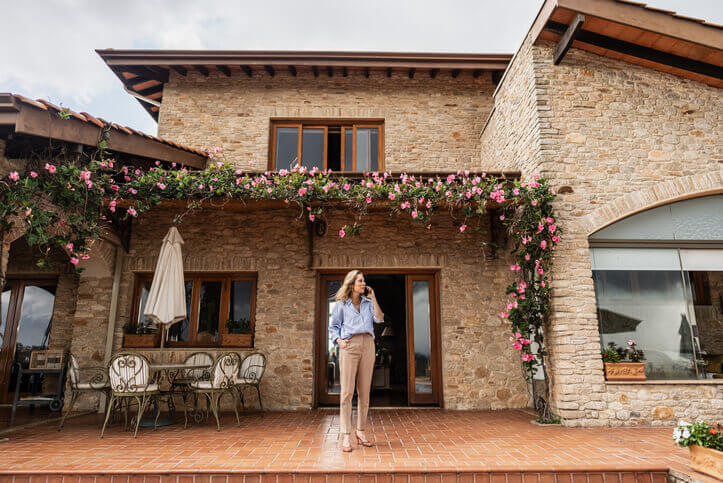
Are non-residents required to pay tax on French property income?
If you own residential property in France, any rental income you receive is subject to French income tax — whether or not you are a resident. What’s more, non-resident landlords are required to file a French property tax return annually with the French tax authorities.
For non-resident individuals, French income tax is charged at progressive rates, after any allowable expense deductions. The amount of tax due can vary depending on whether the property is furnished, unfurnished, or operated under a leaseback arrangement.
At PTI Returns, we’ve specialised in French property tax return filing since 1996. Our convenient, efficient service is designed to guide you through every step of the process — ensuring your return is accurate, compliant, and that you claim all available deductions.
Get startedFrench rental income tax return
If you earn income from a property in France as a non-resident, you are required to file a French tax return each year in May.
Even if you have already submitted a tax return in your home country, you must still file one in France.
You can file your French tax return directly with the French tax authorities. However, many non-residents find the process complex and time-consuming – especially if they don’t speak French.
At PTI Returns, we make filing your French property income tax return simple and stress-free. Our team guides you through every step of the process, ensuring that your return is accurate and that you remain fully tax compliant.
The fee for this service is €420.

VAT refund for French property purchases
If you have purchased a new leaseback rental property in France, you may be entitled to a significant VAT (value-added tax) refund.
New-build properties in France are typically subject to a 20% VAT charge, but in many cases, a large portion of this amount can be reclaimed.
At PTI Returns, we guide you through the entire VAT refund application process, ensuring that your claim is completed correctly and that you receive the maximum refund available from the French tax authorities.
Our fee for this service is 6% of the refund amount (with an upfront payment of €150).
Get started
Starting or ceasing French property rental activity
When you begin renting out property in France as a non-resident, you are required to submit a declaration to the French tax authorities.
Similarly, when you stop renting the property, you must also file a cessation declaration.
Each year, PTI Returns assists thousands of French property owners in preparing the necessary documentation.
Step-by-step we will walk you through the process to ensure your start or cessation declaration is filed accurately and on time – helping you stay fully compliant as an international property investor.
The fee for this service is €150.

Our French rental income tax services & fees
All fees are inclusive of VAT.
Prices are based on the provision of information in pre-agreed format – a surcharge of 20% may be applied for disorganized files.
Prices are based on the provision of necessary backup documentation only – the inclusion of unnecessary documentation may result in the application of an additional charge.
Prepare your French property tax return here.

How it works
Quickly register with PTI Returns
Complete our short online French tax questionnaire and share some important information regarding your property
We will review your information and ensure you are claiming all available expenses, deductions and credits – minimizing your French tax bill
Your tax paperwork will be completed in fully compliance with French tax laws
Discounts for returning customers
Multiple years discount – 10%
This discount is available where returns for 2 or more tax years are required. This discount is applicable to the annual fees excluding any once-off fees and administrative fees and does not apply where other discounts/reductions have been granted.
Multiple tax countries discount
Clients who avail of our tax-filing services for two (or more) countries can claim a 10% discount on our fees. For example, if you file a Spanish and French property tax return, we will reduce our fee by 10%. This discount does not apply where other discounts/reductions have been granted.

French rental income tax FAQs
Capital Gains Tax in France is payable on the sale of a property. The rate of French CGT applied is dependent on the individual’s residency status.
The tax is payable on the profit on disposal i.e. the difference between the sale price and the original purchase price.
If you’re not residing in France, you’ll be subject to a basic tax rate of 19% French CGT along with 17.2% social charges, resulting in a total charge of 36.2%. However, non-residents from the EEA enjoy a lower rate, as they are exempt from the social charges and only need to pay the solidarity tax of 7.5%.
Furthermore, in 2022, the French government confirmed that UK non-residents would also be eligible for exemption from the social charges, instead of having to pay the solidarity tax of 7.5%.
The tax is applied at the sale in the office of the notary.
French tax year – The French tax year runs from 1 January to 31 December.
Business Income & VAT Returns for Leaseback & Furnished Lettings – The deadline to file is 3 May (the year after income was received).
Personal income tax returns and for Micro-Regimes (Micro-BIC & Micro-Foncier) and Non-furnished income tax returns – The deadline to file is mid-May. Exact dates are appointed by the tax authorities and they tend to vary slightly from year to year.
When renting out a French property as a UK resident or Irish resident, you will have the obligation to file two income tax returns to report any income received – one in France, and one in your home country.
You won’t be taxed twice, as there are double taxation agreements between France and Ireland and France and the UK so relief from double taxation is usually available.
Your dedicated property tax advisors can provide further details on double taxation relief and/or they can file a French tax return online.
If you earn rental income from a French property as a non-resident, you are required to file a French tax return each year.
Failing to file your French tax return can lead to:
- Late filing surcharges and interest on unpaid tax
- Loss of deductions or allowances for property expenses
- Delays and complications when selling your property
With that in mind, it’s very important to file your French return before the tax deadline
Yes.
Whether your French property is furnished or unfurnished, you can prepare every tax document you need with PTI Returns.
Yes.
Every year we support thousands of individuals who own multiple properties, both in France and around the world.
The PTI Returns team will help you to correctly declare all relevant information for each of your properties, ensuring you remain fully tax compliant in France.